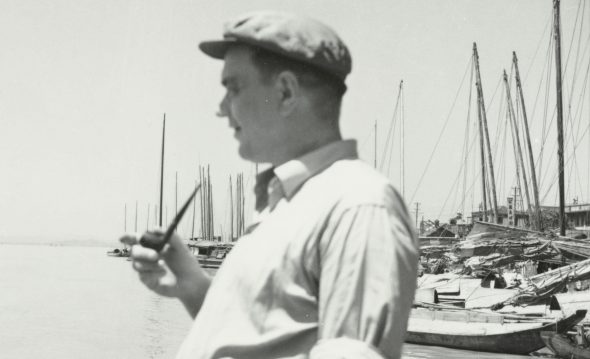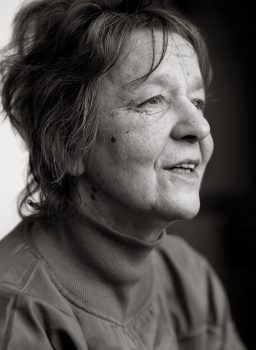Search results for "Что такое архетипы коллективного бессознательного больше в insta---batmanapollo"
Noah’s progeny
30 October 2009 | Fiction, Prose
Extracts from the novel Puupää (‘Blockhead’, Teos, 2009)
In these ‘shavings’ hewn from the block in constructing the storyline of his new novel, Juha Hurme offers us four unique glimpses into the Finnish psyche
The rune singer of Nokia
Three years ago I purchased a used mobile phone when its predecessor took an overdose of sea water and went mute on a rowing trip in a broken-down loaner of a fibreglass boat in a gale-force nor’wester. This three-year-old phone has been a thoroughly satisfactory implement and indispensable contact link. The power button got stuck a year ago, but the gadget is still fully operational with the aid of a match stick or something similar. It is my belief and hope that it will continue to fulfil the role of telephone for seven more years, because I prefer not to own, let alone purchase, anything that withstands fewer than ten years of use. More…
Words like songs
The Finnish poet Helvi Juvonen (1919–1959) often studies small things: moles, lichen, bees and dwarf trees; she ‘doesn’t often dare to look at the clouds’. But small is beautiful; her nature poems and fairy-tales mix humility and the celebration of life. Commentary by Emily Jeremiah
Cup lichen
Luke 17:21
The lichen raised its fragile cup,
and rain filled it, and in the drop
the sky glittered, holding back the wind.
The lichen raised its fragile cup:
Now let’s toast the richness of our lives.
From Pohjajäätä [‘Ground-ice’], 1952) More…
The Comb
30 September 1981 | Archives online, Fiction, Prose
A short story from Tilanteita (‘Situations’, 1962). Introduction by Vesa Karonen
The young man’s comb dropped behind the radiator under the window. The young man crouched down to look and felt with his fingers in between the pipes and along the floor. No trace of the comb.
Lose something on a train and it eludes you. A train ticket I left once – just placed it long enough on the window ledge for it, too, to fall behind the radiator. Couldn’t find it. The conductor came along, said “Any new fares! Tickets please.” I just sat still, totally unconcerned, until he’d gone. I’m sure there are little details which give the game away to conductors, they know who’s just got on.
New passengers are always somehow fresher, more alert. In winter, I hear, they look at the passengers’ feet. If there’s snow round the edges of the shoes, no need to hesitate. A lot of people are done for by looking straight in their eyes. Offenders always look straight back and then in the middle try to look somewhere else entirely. I was careful not to look steadily into the conductor’s eyes. It was easy when I concentrated on the way the long ventilator cords swung back and forth from the ceiling. They all swung in the same direction but some cords were a bit behind the others. Perhaps it was because the cords were all slightly different in weight and length. Now I remember – it’s not the weight that counts, just as it’s not weight that affects the way a pendulum swings. When the conductor had gone I began to look for my ticket again. I went on looking for it all the way to Tampere. The young man, too, would obviously go on looking for his comb until he got where he was going, without finding it. More…
A dictionary of human destinies
31 March 2001 | Fiction, Prose
Short stories from Av blygsel blev Adele fet (‘It was embarrasment that made Adele fat’, Söderström & Co., 2000)
Adele
It was embarrassment that made Adele fat. It wasn’t from hunger that her fridge-fumbling fingers began to grow nimble, but from confusion. And it was never knowing what her tongue ought to say that led her to the concrete business of the fridge. Her tongue certainly knew all about tasting. It could feel her teeth chewing even if it didn’t know how to speak. It became a better and better judge of brussels sprouts and speckled sausage. The rest was just good morning and thanks, thanks and goodbye and nice day. More…
Daddy dear
30 June 2004 | Archives online, Fiction, Prose
Extracts from the novel Vanikan palat (‘Pieces of crispbread’, Otava, 2004). Interview by Soila Lehtonen
Dad’s at the mess again. Comes back some time in the early hours. Clattering, blubbing, clinging to some poem, he collapses in the hall.
We pretend to sleep. It’s not a bad idea to take a little nap. After a quarter of an hour Dad wakes up. Comes to drag us from our beds. Crushes us four sobbing boys against his chest as if he were afraid that a creeping foe intended to steal us. We cry too, of course, but from pain. Four boys belted around a non-commissioned officer is too much. It hurts. And the grip only tightens. Dad whines:
‘Boys, I will never leave you. Dad will never give his boys away. There will be no one who can take you from me.’ More…
Down to business
31 March 2006 | Archives online, Fiction, Prose
An extract from the novel Ystävät kaukana (‘Friends far away’, Gummerus, 2oo5)
The half-day secretary Oksana Pelkonen was already bustling about the office as I squeezed my Mercedes onto the side of Viherniemenkatu Street. I had kept my office next to the Hakaniemi Market even though newer places had been pressed on me. There were new messages taped to the doors and windows, anyway. They explained, in what I thought was a quiet way, that the so VK Corporation’s office was here and that Kärppä Construction, VK East Trade, VK Consulting and Hakaniemi Eastern Aid also belonged to the Group. The slogan was at the bottom: ‘Two centuries’ experience trading with the East’. Would have been just as true to put ‘two millennia’, but the customer might have started to wonder.
‘Good morning, Vityuha, good morning!’ Oksana greeted me doubly. ‘I just put the tea onto steep for you. And look, on top of the pile of mail, three letters to Viktor Kärppä. That’s how I knew you were coming.’ More…
The dead speak kindly
1 November 2012 | Fiction, poetry
Memory, winter and everyday are studied in Tua Forsström’s new collection of poems, En kväll i oktober rodde jag ut på sjön (‘One evening in October I rowed out on the lake’, Schildts & Söderströms, 2012). Introduction by Michel Ekman
I fell through the papers laid aside
I came to a place where I was supposed to stay
for four nights but I stayed four years
Someone said: you have caused the council considerable expense
I said: this is my situation
A brave little cat came to my rescue
I could see what I wanted in the dark
at night and no one saw me
It was like a dream but I wasn’t dreaming
I was not afraid and I could pass through chalcedony
I could pass through quartz crystals
I could pass through sad and sick
On the bottom in the mud coins from many lands lay gleaming
We wish for anything between heaven and earth
All that we see and cannot see and lost
I do not recognise myself, and no one sees me More…
A view to a kill
31 December 1997 | Archives online, Fiction, Prose
Extracts from the novel Klassikko (‘The classic’, WSOY, 1997). Pete drives an old Toyota Corolla without a thought for the small animals that meet their death under its wheels – or anything else, for that matter. Hotakainen describes the inner life of this environmental hazard with accuracy and precision
Pete sat in his Toyota Corolla destroying the environment. He was not aware of this, but the lifestyle he represented endangered all living things. The car’s exhaust fumes spread into the surroundings, its aged engine sweated oil onto the pavement, and malodorous opinions withered the willowherbs by the roadside. Granted that Pete was an environmental hazard, one must nevertheless ask oneself: how many people does one like him provide with employment? He leaves behind him a trail of despondent girlfriends who require the services of human relations workers, popular songwriters, and social service officials; during his lifetime, he spends tens of thousands of marks in automotive shops and service stations, on spare parts and small cups of coffee; he benefits the food industry by being a carefree purchaser of TV dinners and soft drinks. Pete is the perfect consumer, an apolitical idiot who votes with his wallet, the favorite of every government, even though no one seems interested in putting him to work, least of all himself. Every government, regardless of political power struggles, encourages its people to consume. Pete needs no encouragement, he consumes unconsciously, and one might ask: is there anything that he does consciously, the Greens and left-wingers would like him to? Does Pete make smart long-range decisions? Hardly.
Northern exposure
3 September 2005 | Archives online, Fiction, Prose
Extracts from the novel Valon reunalla (‘At the edge of light’, Teos, 2005). Introduction by Kristina Carlson
Kari
The village despised all those who left. They hated us too, though we were still only planning our final escape.
We used to escape the village. We would hide from its gaze in the forest or the cemetery where the gravestones were so close together that there was no room for the trees to grow. We knew why the freight train brought the village so many dead and so few living. It was the village’s fault. It had a wicked soul. The grown-ups didn’t know it. We knew it, but no one asked us. Death was within us; it was alive. Asking would have been too dangerous….
On the backs of the headstones we carved our own marks with the end of a knife. We blew out the candles laid at the graves of suicide victims. We worshipped them in the dark and no new candles were ever brought to their graves. The parents of those who died so young drove south. They were looking for stations with real waiting rooms and staff that made announcements. They sat on the hard benches waiting, waiting for the trains to come, at the right time; hoping the years wouldn’t wreak havoc after all, hoping they’d roll slowly back along the tracks, to brighten as they approached the village, giving life once again to their children. And everything could start over. More…
Wolf-eye
30 June 2004 | Archives online, Fiction, Prose
Extracts from the novel Käsky (‘Command’, WSOY, 2003). Introduction by Jarmo Papinniemi
Only once he had led the woman into the boat and sat down in the rowing seat did it occur to Aaro that it might have been advisable to tie the woman’s hands throughout the journey. He dismissed the thought, as it would have seemed ridiculous to ask the prisoner to climb back up on to the shore whilst he went off to find a rope.
It was a mistake.
After sitting up all night, being constantly on his guard was difficult. Sitting in silence did not help matters either, but they had very few things to talk about. More…




